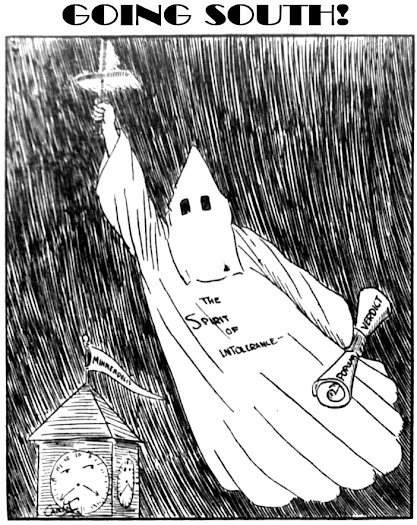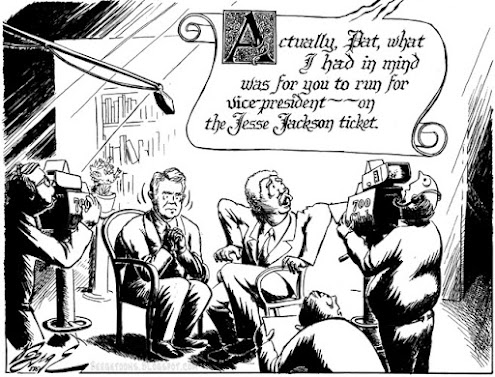The 1920's were a high-water mark for conservative movements in the U.S.A., and that includes the Ku Klux Klan.
 |
| "The South Will Soon Be Demanding Restriction of Migration of Its Labor" by John McCutcheon in Chicago Tribune, May 10, 1923 |
The differential in wages was certainly a contributing factor, but Klan activity in the South, where it had thoroughly permeated local and state government and law enforcement, was a significant impetus compelling the Great Migration of Black Americans north. Time magazine reported (May 5, 1923) that 32,000 Blacks had left Georgia, 22,750 had quit South Carolina, and 20,000 fled Alabama, an exodus that "almost rivals the phenomenal movement of 1915-16, when the best authorities estimate that 250,000 went North."
Contrary to John McCutcheon's cartoon, southern governments do not appear to have been alarmed by the exodus. Race-based and church groups up north, on the other hand, often had their hands full dealing with the newcomers.
Hauling livestock and whatever else they could from their farms, Blacks arrived at Penn Station every weekend. The new arrivals faced many of the same attitudes repeated in the "immigration crisis" of today (yet were not bused back south to Florida or Texas).
Crusader News Service quoted a New York City spokesperson for Travelers Aid Society on June 20, 1923:
"It is argued that we get the bad element, the undesirables. This is true only relatively. We get some good and we get some bad. The good we get need a chance and opportunity if they are to remain good. The bad must have a chance, an opportunity, some instructions, some help if they are to become good.
"Before we hasten to discourage the brother whose flight from the South is just a little later than our own, let us give him a chance, a man's chance. Strangers are suspicious of other strangers, and naturally so. It is our duty to offer the welcome, and they will accept it in the spirit given.
"We have little reason to point out their faults, their awkwardness, their crude customs, their revolvers, and their lack of decorum, until we are sure they have been taught by us in all the things known to our community life."
Crusader News Service didn't identify that spokesperson, but I think you can probably guess the color of his or her skin.
Migrants north arrived to find that the Klan was already here. The Klan became an issue in the mayoral contest in Minneapolis in the spring of 1923, after their local publication there, The Voice of the Knights of the Ku Klux Klan, published allegations against incumbent Mayor, George Leach.
 |
| "Going South" by Wilfred Canan in Minneapolis Daily Star May 19, 1923 |
The Voice had published an accusation by one Gladys Kennedy that Mayor Leach had visited her gambling house for "wild parties" and had carried on an affair with her. Leach fought back, taking five Klan members to court. They included Klan "Exalted Cyclops" Roy H. Miner, who was running against Leach for mayor, editor and publisher of Hennepin County Enterprise George Silk, and suspended deputy sheriff Thomas Sullivan.
In May, a Minneapolis jury found the five guilty of libel. Kennedy recanted her allegations, but she and Miner were sentenced to 90 days at a workhouse. Silk and Sullivan received 60-day sentences; and Shirley Reichert, a University of Minnesota student who as a notary public received the Kennedy affidavit, was fined $50.
 |
| "The Usurper" by William F. Canan in Minneapolis Daily Star, June 9, 1923 |
Miner withdrew from the mayoral race. In June, the Minneapolis Daily Star reported that the mayoral candidate replacing Miner, State Senator William A. Campbell, was under investigation for being a leader in the Minnesota Klan. Campbell had supposedly written a number of articles for the Voice alleging malfeasance by various city council members.
Leach would be reelected by a hefty margin.
 |
| "Tearing Off the Sheet" by Rollin Kirby in New York World, ca. May 29, 1923 |
In New York and New Jersey, the Klan staged mass protests against an amendment proposed by State Senator (later Mayor of New York City) Jimmy Walker to New York's Civil Rights Law compelling unmasking of KKK members.
Signed into law by Governor Al Smith, the Walker Amendment didn't mention the Klan by name, instead requiring "every existing corporation and every existing unincorporated association having a membership of 20 or more person, which incorporation or association requires an oath as a prerequisite or precondition of membership, other than a labor union or a benevolent order mentioned in the Benevolent Orders Law... [to] file with the Secretary of State a sworn copy of its constitution, by-laws, rules, regulations, and oath of membership, together with a roster of its membership and list of its officers for the current year."
 |
| New York Daily News, May 28, 1923 |
The New York Daily News reported that 8,000 klansmen gathered at Eastport, Long Island; the newspaper's photographers were at a simultaneous rally in Pompton Lakes, New Jersey. Further demonstrations were reported in Syracuse, Buffalo, Schenectady, and Binghamton.
 |
| "Civilization, 1923" by Nelson Harding in Brooklyn Daily Eagle, May 31, 1923 |
A hooded speaker identified as the King Kleagle swore to the Pompton Lakes mob, "Al Smith by signing that bill barred himself forever from the presidency of the United States."
Given that Smith was Roman Catholic by faith, the Klan was already predisposed against his presidential aspirations. By the time he was the Democratic nominee in 1928, the Klan's "whispering campaign" attacking him was well-established.
Klan opposition would have nothing to do with Mayor Walker's eventual downfall, however.
Constitutionality of the Walker Law would ultimately be upheld by the New York and United States Supreme Courts in a case brought by Buffalo Klansman George C. Bryant, who argued that it violated the Equal Protection clause of the Constitution.
In the U.S. Supreme Court's decision, Justice Willis Van Devanter wrote the Walker Law could legally single out the Klan, given that
"it was conducting a crusade against Catholics, Jews, and negroes, and stimulating hurtful religious and race prejudices; that it was striving for political power, and assuming a sort of guardianship over the administration of local, state, and national affairs, and that at times it was taking into its own hands the punishment of what some of its members conceived to be crimes.
"We think it plain that the action of the courts below in holding that there was a real and substantial basis for the distinction made between the two sets of associations or orders was right, and should not be disturbed."

.jpg)







































